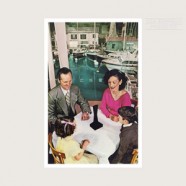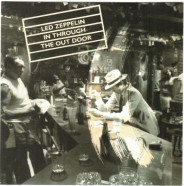Led Zeppelin
-
 Led Zeppelin
Led Zeppelin
1969 -
 Led Zeppelin II
Led Zeppelin II
1969 -
 Led Zeppelin III
Led Zeppelin III
1970 -
 Led Zeppelin IV
Led Zeppelin IV
1971 -
 Houses of the Holy
Houses of the Holy
1973 -
 Physical Graffiti
Physical Graffiti
1975 -
 Presence
Presence
1976 -
 In Through The Out Door
In Through The Out Door
1979
Led Zeppelin - Kashmir / 1975 live
| Adaugat de pache | 22.04.2012 |  Adauga
la favorite Adauga
la favorite |
1.614 vizualizari Nota film: 0 / 5 (0 voturi ) |
|||||||||
Led Zeppelin - Kashmir / live 1975
Versuri:
Oh let the sun beat down upon my face, stars to fill my dream
I am a traveler of both time and space, to be where I have been
To sit with elders of the gentle race, this world has seldom seen
They talk of days for which they sit and wait and all will be revealed
Talk and song from tongues of lilting grace, whose sounds caress my ear
But not a word I heard could I relate, the story was quite clear
Oh, oh.
Oh, I been flying... mama, there ain't no denyin'
I've been flying, ain't no denyin', no denyin'
All I see turns to brown, as the sun burns the ground
And my eyes fill with sand, as I scan this wasted land
Trying to find, trying to find where I've been.
Oh, pilot of the storm who leaves no trace, like thoughts inside a dream
Heed the path that led me to that place, yellow desert stream
My Shangri-La beneath the summer moon, I will return again
Sure as the dust that floats high in June, when movin' through Kashmir.
Oh, father of the four winds, fill my sails, across the sea of years
With no provision but an open face, along the straits of fear
Ohh.
When I'm on, when I'm on my way, yeah
When I see, when I see the way, you stay-yeah
Ooh, yeah-yeah, ooh, yeah-yeah, when I'm down...
Ooh, yeah-yeah, ooh, yeah-yeah, well I'm down, so down
Ooh, my baby, oooh, my baby, let me take you there
Let me take you there. Let me take you there
_________________________________
Physical Graffiti is the sixth album, a double album by the English hard rock band Led Zeppelin. It was released on February 24, 1975 (see 1975 in music) and was the band's first release on its own Swan Song Records label.
The remaining eight songs were all recorded during the sessions for Physical Graffiti in early 1974. Additional overdubs were added and the final mixing was performed in October 1974 by Keith Harwood.
The original album jacket for the LP included die-cut windows on the building shown on the cover. As the inner sleeves for the discs were inserted in different orientations, various objects and people would appear in the windows, including photos of the band members in drag. The two buildings photographed for the album cover are located at 96 and 98 St. Mark's Place in New York City.[1] [2] These are the same buildings Mick Jagger is in front of in the Rolling Stones music video "Waiting on a Friend".
A review in Rolling Stone magazine referred to Physical Graffiti as Led Zeppelin's "bid for artistic respectability", adding that the only competition the band had for the title of 'World's Best Rock Band' were The Rolling Stones and The Who.[3] The album was a massive commercial and critical success, reaching #1 on Billboard's Pop Albums chart, and has proven to be one of the most popular releases by the group, selling 16 million copies in the United States alone. Physical Graffiti was the first album to go gold on advance orders alone.[4] Shortly after the release of Physical Graffiti, all previous Led Zeppelin albums simultaneously re-entered the top-200 album chart.[5] In 1998 Q magazine readers voted Physical Graffiti the 28th greatest album of all time; in 2000 Q placed it at number 32 in its list of the 100 Greatest British Albums Ever; and in 2001 the same magazine named it as one of the 50 Heaviest Albums Of All Time. In 2003 the TV network VH1 named it the 71st greatest album ever. Rolling Stone ranked it #70 on their list of the 500 Greatest Albums of All Time.
Versuri:
Oh let the sun beat down upon my face, stars to fill my dream
I am a traveler of both time and space, to be where I have been
To sit with elders of the gentle race, this world has seldom seen
They talk of days for which they sit and wait and all will be revealed
Talk and song from tongues of lilting grace, whose sounds caress my ear
But not a word I heard could I relate, the story was quite clear
Oh, oh.
Oh, I been flying... mama, there ain't no denyin'
I've been flying, ain't no denyin', no denyin'
All I see turns to brown, as the sun burns the ground
And my eyes fill with sand, as I scan this wasted land
Trying to find, trying to find where I've been.
Oh, pilot of the storm who leaves no trace, like thoughts inside a dream
Heed the path that led me to that place, yellow desert stream
My Shangri-La beneath the summer moon, I will return again
Sure as the dust that floats high in June, when movin' through Kashmir.
Oh, father of the four winds, fill my sails, across the sea of years
With no provision but an open face, along the straits of fear
Ohh.
When I'm on, when I'm on my way, yeah
When I see, when I see the way, you stay-yeah
Ooh, yeah-yeah, ooh, yeah-yeah, when I'm down...
Ooh, yeah-yeah, ooh, yeah-yeah, well I'm down, so down
Ooh, my baby, oooh, my baby, let me take you there
Let me take you there. Let me take you there
_________________________________
Physical Graffiti is the sixth album, a double album by the English hard rock band Led Zeppelin. It was released on February 24, 1975 (see 1975 in music) and was the band's first release on its own Swan Song Records label.
The remaining eight songs were all recorded during the sessions for Physical Graffiti in early 1974. Additional overdubs were added and the final mixing was performed in October 1974 by Keith Harwood.
The original album jacket for the LP included die-cut windows on the building shown on the cover. As the inner sleeves for the discs were inserted in different orientations, various objects and people would appear in the windows, including photos of the band members in drag. The two buildings photographed for the album cover are located at 96 and 98 St. Mark's Place in New York City.[1] [2] These are the same buildings Mick Jagger is in front of in the Rolling Stones music video "Waiting on a Friend".
A review in Rolling Stone magazine referred to Physical Graffiti as Led Zeppelin's "bid for artistic respectability", adding that the only competition the band had for the title of 'World's Best Rock Band' were The Rolling Stones and The Who.[3] The album was a massive commercial and critical success, reaching #1 on Billboard's Pop Albums chart, and has proven to be one of the most popular releases by the group, selling 16 million copies in the United States alone. Physical Graffiti was the first album to go gold on advance orders alone.[4] Shortly after the release of Physical Graffiti, all previous Led Zeppelin albums simultaneously re-entered the top-200 album chart.[5] In 1998 Q magazine readers voted Physical Graffiti the 28th greatest album of all time; in 2000 Q placed it at number 32 in its list of the 100 Greatest British Albums Ever; and in 2001 the same magazine named it as one of the 50 Heaviest Albums Of All Time. In 2003 the TV network VH1 named it the 71st greatest album ever. Rolling Stone ranked it #70 on their list of the 500 Greatest Albums of All Time.
Semnaleaza o problema
Afiseaza playlist (total video: 0)
Prin utilizarea serviciilor noastre, iti exprimi acordul cu privire la faptul ca folosim module cookie in vederea analizarii traficului si a furnizarii de publicitate.

















































 Sterge
din favorite
Sterge
din favorite